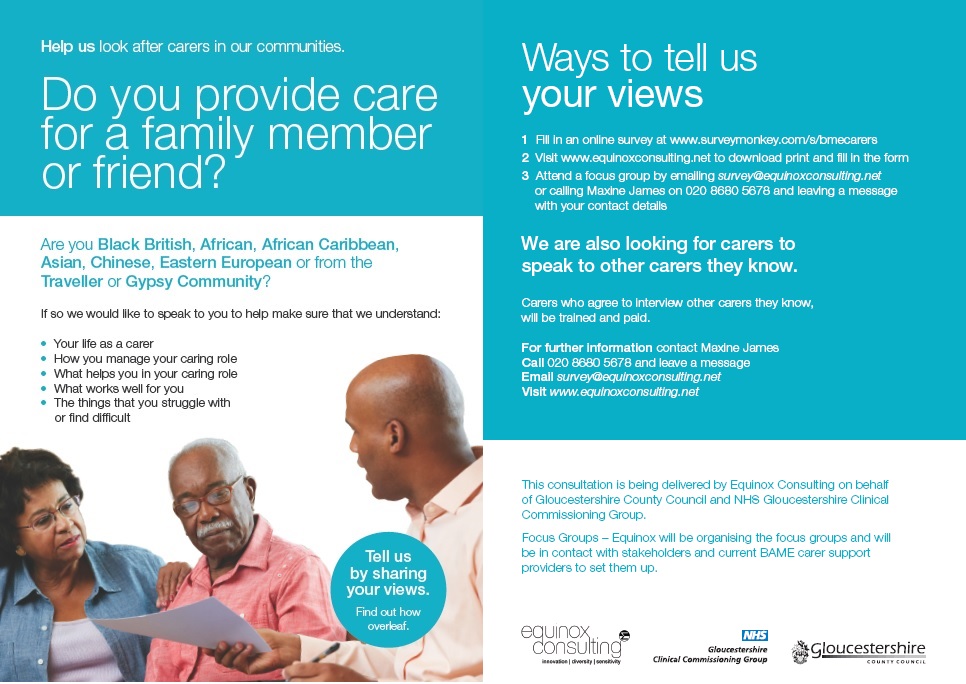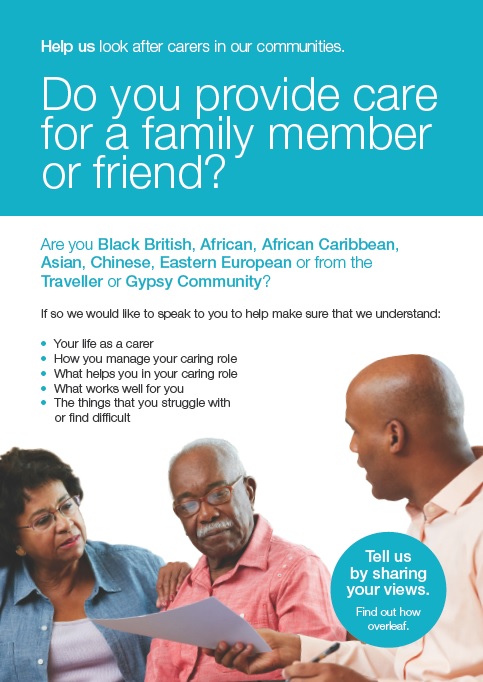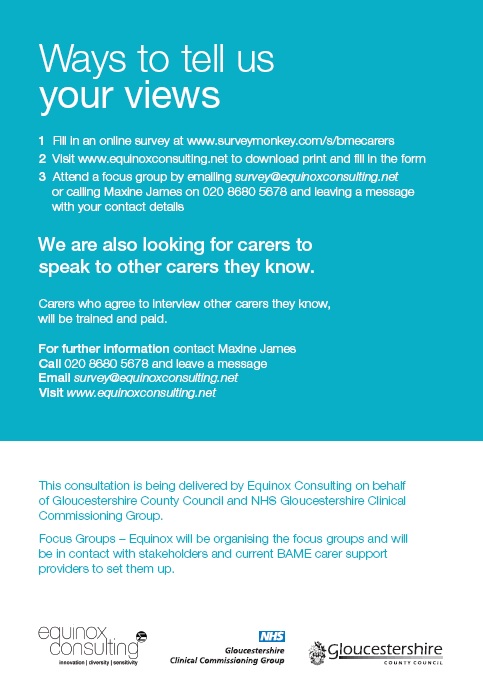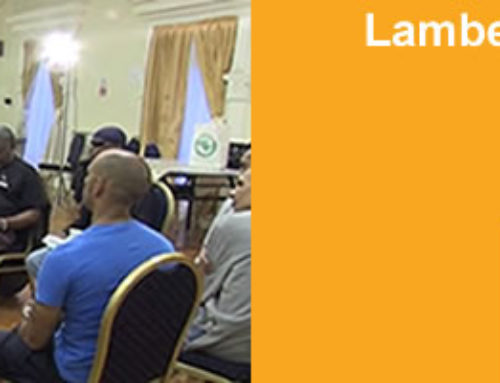Supporting Black and Minority Ethnic Carers in Gloucestershire

Throughout this country there are a lot of people who care, unpaid, for a family member or friend who due to illness, disability, a mental health problem or an addiction cannot cope without their support, and provides assistance to them in diverse ways. Conventional wisdom in this country suggests that most ethnic minority people will do so for their loved ones, children and relatives and indeed should see it not just as a labour of love but as an obligation or duty, but the fact of this unpaid duty can leave you physically, mentally and emotionally drained to the extent that the longer you do it without support the more you are in danger of being unwell yourself and being isolated because of your dedication to this duty of caring.
Considering the fact that these willing band of carers save the country nearly £119 billion a year, their work is recognised by both national and local governments who provide some support to ensure that carers are able to continue with their role as carers and that the cared for continue to enjoy a higher quality of life than if they were placed at higher costs to the government in institution.
The issues that confront carers and the support they provide however cannot be seen as a one size fits all, but one of the major worry for most carers is how the cared for will function when the carer has to be away for any length of time. The alternative can be very expensive with social services having to find a suitable carer at short notice or in extreme cases having to pay for the care to be given in a home or a hospital.

Therein lies the problem however for most black and ethnic minority carers, who provide a lot of care that is hidden because they see it as part of their duty of care, or they would they do not know that help is available to support them as carers or because they think that asking for help would mean that they cannot cope even with their basic duties of care to a loved one or because they feel that the cared for would not be properly looked after if they were taken into an institution. The combination of these factors means that these BAME carers who save the nation more than £8 billion annually, do not ask for help that is available.
But role of a carer could be difficult some carers have to juggle their paid work around their caring role which can impact their career and earning power as some carers give up their job prematurely and where the carer is a child it can affect their school work. But it is not only work that it affects, because for some being a carer means a deprivation of their usual leisure time leaving no time for them to unwind. Sometimes the good work that is done by these carers takes its toll in several ways: they get tired physically, they worry mentally about what would happen if they are unable to provide the care.
Most of the support provided is actually beneficial to the carers once they have been identified and accessed. Identifying hidden carers is often an important task for local authorities who have a responsibility to commission the support that is provided to carers by specialist and generalist organisations who provide support. The typical support that is provided includes a) breaks from caring to enable carers have some respite in doing other things such as getting out of their homes, b) emotional support to work through any problems that they may have and help relieve the stress involved in nursing a loved one back to health c) appropriate advice and information on what they need to know about the welfare system and advocacy to channel information about their needs to the authorities, d) carers well being to ensure that they are well enough to cope with the strain of caring and e) improving practical caring skills and looking after themselves.
For most ethnic minority people, this support for carers was provided by community and welfare organisations who helped in accessing the needs of the community and providing general welfare and advocacy services for the target community as a whole, but in these days of professionalism within the local authority there is a need to gather enough information about the communities before commissioning services for them and most service delivering is properly monitored and the outputs and outcomes reported which means that carers can now get a good service from those commissioned to provide these services.
But there may be some complication in throwing this service to just any organisation to provide in a colour blind way because there are some cultural issues at hand that may detract from black Asian and ethnic minority carers not going to mainstream providers and not getting the right service from these organisation.

Some issues that need to be considered is to what extent the carers needs a culturally sensitive service, are there any barriers of language, are there issues of religion, are there issues about food and dietary needs and customs that need to be cater for before there is a better relationship between carer support organisations and the carers that they support.
To what extent are the carer support organisation able to provide the most appropriate service in the area of personalisation or black and ethnic minority carers considering that one cannot apply a one size fit all approach to the service provision and some carers may better appreciate one aspect of the service than another.
These are interesting issues to further explore and in working on a project for Gloucestershire county council that commissions support for carers from different organisations we are investigating how carers view the services that they receive and whether indeed there are a large number of hidden black and ethnic minority carers who will be better served if more is known about their requirements.
If you live in Gloucestershire and you provide care for a family member or friend or friend who due to illness, disability, a mental health problem or an addiction cannot cope without their your support and are Black British, African, African Caribbean, Asian, Chinese, Eastern European from the Traveler or Gypsy Community, we will like to speak to you to help make sure that we understand: your life as a carer, how you manage your caring role, what helps you in your caring role, what works well for you, the things that you struggle with and find difficult, the things that would make you a better carer and any insights to your caring role that you would want to share with us.
If you also want to participate in the research by interviewing other carers that you know then please contact Maxine James, Equinox Consulting at survey@equinoxconsulting.net or telephone her on 020 88680 5678 and leave a message for Maxine or alternatively you can fill in the questionnaire at www.surveymonkey.com/s/bmecarers/ or download more information at www.equinoxconsulting.net
Ade Sawyerr is a partner at Equinox Consulting a management consultancy that works on social and economic issues affecting disadvantaged communities in Britain. He passes comment on and social cultural and political issues of African heritage people in the Diaspora. He can be followed @adesawyerr or atadesawyerr@wordpress.com



[…] Review of support for BME carers – Gloucestershire County Council is also reviewing its support for all BME carers. The review will involve understanding how BME carers manage their role as a carer, what helps them in their caring role, what works well for them and what they struggle with or find difficult. The review is being carried out by Equinox Consulting and feedback will be sought via an online survey, in-depth discussions with carers and at focus groups throughout the county. The online survey is available via the following weblink or you can find out more information/download a copy of the survey to fill in by visiting their website. […]